ARTEMIS MYTHS 1
Greek Name
Αρτεμις
Transliteration
Artemis
Latin Spelling
Artemis
Translation
Diana
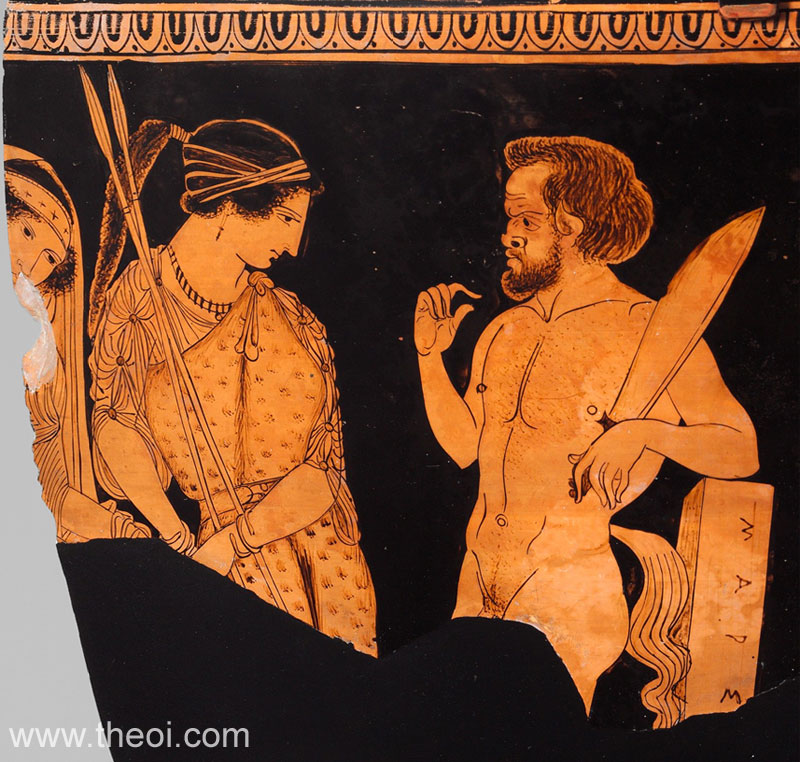
ARTEMIS was the Olympian goddess of hunting, wild animals, children and birth.
This page contains tales of the goddess from the saga of the gods including her birth and childhood, virginity, and role in the War of the Giants.
CLASSICAL LITERATURE QUOTES
BIRTH OF ARTEMIS
Hesiod, Theogony 918 ff (trans. Evelyn-White) (Greek epic C8th or 7th B.C.)
:
"And Leto was joined in love with Zeus who holds the aigis, and bare Apollon and Artemis delighting in
arrows (iokheaira), children lovely above all the sons of Heaven."
Homeric Hymn 3 to Delian Apollo 16 ff (trans. Evelyn-White) (Greek epic C7th or 6th
B.C.) :
"Blessed Leto, you bare glorious children, the lord Apollon and Artemis Iokheaira (who delights in arrows);
her in Ortygia, and him in rocky Delos."
Homeric Hymn 3 to Artemis 14 ff :
"Neat-ankled Leto bare children [Apollon & Artemis] supreme among the immortals both in thought and in
deed."
Pindar, Processional Song on Delos (trans. Sandys) (Greek lyric C5th B.C.)
:
"Hail. O heaven-built isle, most lovely scion of the children of bright-haired Leto [Apollon and Artemis],
O daughter of the sea, thou unmoved marvel of the spacious earth, by mortal men called Delos, but by the blessed
gods of Olympos known as the far-seen star (astra) of the dark-blue sea . . . For aforetime, that isle
was tossed on the waves by all manner of whirling winds; but, when Leto, the daughter of Koios, in the frenzy of
her imminent pangs of travail, set foot on her, then it was that four lofty pillars rose from the roots of
earth, and on their capitals held up the rock with their adamantine bases. There it was that she gave birth to,
and beheld, her blessed offspring [Apollon and Artemis]."
Greek Lyric Scolia Fragment 886 (trans. Campbell, Vol. Greek Lyric V) (B.C.)
:
"In Delos Leto bore children once, gold-haired Phoibos, lord Apollon, and the deer-shooting huntress
Artemis, who holds great power over women."
Pseudo-Apollodorus, Bibliotheca 1. 21 (trans. Aldrich) (Greek mythographer C2nd A.D.)
:
"Of the daughters of Koios . . . Leto had relations with Zeus, for which she was hounded by Hera all over
the earth. She finally reached Delos and gave birth to Artemis, who thereupon helped her deliver Apollon.
Artemis became a practised huntress and remained a virgin."
Callimachus, Hymn 3 to Artemis 22 ff (trans. Mair) (Greek poet C3rd B.C.)
:
"Even in the hour when I [Artemis] was born the Moirai (Fates) ordained that I should be their helper
[women in childbirth], forasmuch as my mother suffered no pain either when she gave me birth or when she carried
me win her womb, but without travail put me from her body."
Orphic Hymn 35 to Leto (trans. Taylor) (Greek hymns C3rd B.C. to 2nd A.D.)
:
"Dark-veiled Leto, much invoked queen, twin-bearing Goddess . . . Phoibos [Apollon] proceeds from thee, the
God of light, and Artemis fair, whom winged darts delight; she in Ortygia's honoured regions born, in Delos he,
which lofty mounts adorn."
Quintus Smyrnaeus, Fall of Troy 11. 22 ff (trans. Way) (Greek epic C4th A.D.)
:
"Fair Xanthos' stream, the stream revealed to men by Leto, bride of Thunderer Zeus, when Lykia's stony
plain was by her hands uptorn mid agonies of travail-throes wherein she brought to light mid bitter pangs those
babes of birth divine [Apollon and Artemis]."
Strabo, Geography 10. 5. 2 (trans. Jones) (Greek geographer C1st B.C. to C1st A.D.)
:
"From olden times, beginning with the times of the heroes, Delos has been revered because of its gods, for
the myth is told that there Leto was delivered of her travail by the birth of Apollon and Artemis : ‘for
aforetime,’ says Pindaros, ‘it was tossed by the billows, by the blasts of all manner of winds, but
when [Leto] the daughter of Koios in the frenzied pangs of childbirth set foot upon it, then did four pillars,
resting on adamant, rise perpendicular from the roots of the earth, and on their capitals sustain the rock. And
there she gave birth to, and beheld, her blessed offspring.’"
Strabo, Geography 14. 1. 20 :
"On the same coast [of Ephesos, Asia Minor], slightly above the sea, is also Ortygia [an island which in
rivalry with Delos, claimed to be the birth place of Apollon and Artemis], which is a magnificent grove of all
kinds of trees, of the cypress most of all. It is traversed by the Kenchrios River, where Leto is said to have
bathed herself after her travail. For here is the mythical scene of the birth [of Apollon and Artemis], and of
the nurse Ortygia, and of the holy place where the birth took place, and of the olive tree near by, where the
goddess is said first to have taken a rest after she was relieved from her travail. Above the grove lies Mt.
Solmissos, where, it is said, the Kouretes stationed themselves, and with the din of their arms frightened Hera
out of her wits when she was jealously spying on Leto, and when they helped Leto to conceal from Hera the birth
of her children [Apollon and Artemis]."
Pausanias, Description of Greece 1. 31. 1 (trans. Jones) (Greek travelogue C2nd A.D.)
:
"At Zoster [in Attika] is an altar . . . to Apollon, to Artemis and to Leto. The story is that Leto did not
give birth to her children here, but loosened her girdle with a view to her delivery [on her way to Delos], and
place received its name from this incident."
Pausanias, Description of Greece 6. 22. 8 :
"The Eleans, I think, called Artemis Elaphiaia from the hunting of the deer (elaphos). But they
themselves say that Elaphios was the name of a native woman by whom Artemis was reared."
Pausanias, Description of Greece 1. 19. 6 :
"Across the Illisos [River] is a district [of Athens] called Agrai and a temple of Artemis Agrotera (the
Huntress). They say that Artemis first hunted here when she came from Delos [after her birth]."
Pseudo-Hyginus, Fabulae 53 (trans. Grant) (Roman mythographer C2nd A.D.) :
"Latona [Leto] was borne there [to the island of Ortygia] at Jove's command by the wind Aquilo [Boreas], at
the time when the Python was pursuing her, and there, clinging to an olive, she gave birth to Apollo and Diana
[Artemis]. Ortygia was later called Delos."
Pseudo-Hyginus, Fabulae 140 :
"There [on the island of Ortygia] Latona, clinging to an olive tree, bore Apollo and Diana [Artemis], to
whom Vulcanus [Hephaistos] gave arrows as gifts [on the day of their birth]."
Ovid, Metamorphoses 6. 185 ff (trans. Melville) (Roman epic C1st B.C. to C1st A.D.)
:
"Latona [Leto] whom the great globe once refused the smallest spot to give her children birth. Not earth,
nor sky, nor water would accept your goddess, outcast from the world, until Delos took pity on her wanderings
and said, ‘You roam the land and I the sea, homeless,’ and gave her drifting refuge there. She bore
two children [Apollon and Artemis]."
Ovid, Metamorphoses 7. 384 ff :
"Calauria's fields [the island of Delos], Letois' [Artemis'] isle."
Seneca, Hercules Furens 4 ff (trans. Miller) (Roman tragedy C1st A.D.) :
"[Hera complains :] ‘I must dwell on earth, for harlots [mistresses of Zeus and their sons] hold the
sky . . . and they [Apollon and Artemis] at whose birth the unsteady land [Delos island] stood
firm.’"
Nonnus, Dionysiaca 27. 259 ff (trans. Rouse) (Greek epic C5th A.D.) :
"When Leto carried her twin burden [pregnant with Apollon and Artemis] she had to wander over the world,
tormented with the pangs of childbirth . . . until Delos gave help to her labour, until the old palmtree played
midwife for Leto with her poor little leaves."
For MORE information on the mother of Artemis and her trials see LETO
CHILDHOOD OF ARTEMIS (CALLIMACHUS HYMN)
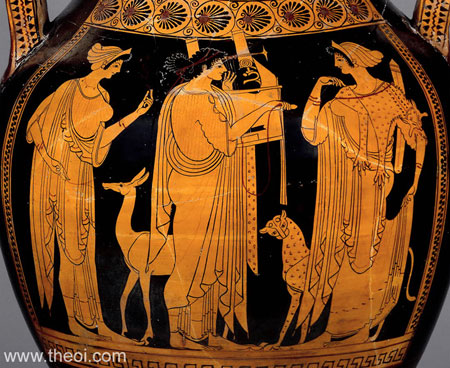
I. ARTEMIS PETITIONS ZEUS FOR DIVINE PRIVILEGES
Callimachus, Hymn 3 to Artemis 1 ff (trans. Mair) (Greek poet C3rd B.C.) :
"Of Artemis we hymn--no light thing is it for singers to forget her--whose study is the bow and the
shooting of hares and the spacious dance and sport upon the mountains; beginning with the time when sitting on
her father's knees--still a little maid--she spake these words to her sire [Zeus] : ‘Give me to keep my
maidenhood, Father, forever: and give me to be of many names, that Phoibos [Apollon] may not vie with me. And
give me arrows and a bow--stay, Father, I ask thee not for quiver or for mighty bow: for me the Kyklopes will
straightway fashion arrows and fashion for me a well-bent bow. But give me to be Phaesphoria (Bringer of Light)
and give me to gird me in a tunic with embroidered border reaching to the knee, that I may slay wild beasts. And
give me sixty daughters of Okeanos for my choir--all nine years old, all maidens yet ungirdled; and give me for
handmaidens twenty Nymphai Amnisides [of the Amnisos River in Krete] who shall tend well my buskins, and, when I
shoot no more at lynx or stag, shall tend my swift hounds. And give to me all mountains; and for city, assign me
any, even whatsoever thou wilt: for seldom is it that Artemis goes down to the town. On the mountains will I
dwell and the cities of men I will visit only when women vexed by the sharp pang of childbirth call me to their
aid--even in the hour when I was born the Moirai (Fates) ordained that I should be their helper, forasmuch as my
mother suffered no pain either when she gave me birth or when she carried me win her womb, but without travail
put me from her body.’
So spake the child and would have touched her father's beard, but many a hand did she reach forth in vain, that
she might touch it [in supplication]. And her father smiled and bowed assent. And as he caressed her, he said :
‘When goddesses bear me children like this, little need I heed the wrath of jealous Hera. Take, child, all
that thou askest, heartily. Yea, and other things therewith yet greater will thy father give thee. Three times
ten cities and towers more than one will I vouchsafe thee--three times ten cities that shall not know to glorify
any other god but to glorify the only and be called of Artemis And thou shalt be Watcher over Streets and
harbours.’ So he spake and bent his head to confirm his words.
II. ARTEMIS OBTAINS HER EIGHTY ATTENDANT-NYMPHAI
"And the maiden [Artemis] faired unto the white mountain of Krete leafy with woods [to fetch twenty Nymphai Amnisiades]; thence unto Okeanos [for sixty Nymphai Okeanides]; and she chose many Nymphai all nine years old, all maidens yet ungirdled. And the River Kairatos [or Amnisos] was glad exceedingly, and glad was Tethys that they were sending their daughters to be handmaidens to the daughter of Leto.
III. ARTEMIS OBTAINS HER BOW & ARROWS FROM THE KYKLOPES
"And straightway she went to visit the Kyklopes. Them she found in the isle of Lipara--Lipara in later
days, but at the at time its name was Meligounis--at the anvils of Hephaistos, standing round a molten mass of
iron. For a great work was being hastened on: they fashioned a horse-trough for Poseidon. And the Nymphai were
affrighted when they saw the terrible monsters like unto the crags of Ossa: all had single eyes beneath their
brows, like a shield of fourfold hide for size, glaring terribly from under; and when they heard the din of the
anvil echoing loudly, and the great blast of the bellows and the heavy groaning of the Kyklopes themselves. For
Aitna cried aloud, and Trinakia cried, the seat of the Sikanians (Sicilians), cried too their neighbour Italia,
and Kyrnos therewithal uttered a mighty noise, when they lifted their hammers above their shoulders and smote
with rhythmic swing the bronze glowing from the furnace or iron, labouring greatly. Wherefore the Okeaninai
(daughters of Okeanos) could not untroubled look upon them face to face nor endure the din in their ears. No
shame to them! On those not even the daughters of the Blessed look without shuddering. Though long past
childhood's years . . . But thou, Maiden [Artemis], even earlier, while yet but three years old, when Leto came
bearing thee in her arms at the bidding of Hephaistos that he might give thee handsel [gifts for the new-born]
and [the Kyklops] Brontes set thee on his stout knees - thou didst pluck the shaggy hair of his great breast and
tear it out by force. And even unto this day the mid part of his breast remains hairless, even when mange
settles on a man's temples and eats the hair away.
Therefore right boldly didst thou address them then : ‘Kyklopes, for me too fashion ye a Kydonian [of the
style of Kydos in Krete] bow and arrows and a hollow casket for my shafts; for I also am a child of Leto, even
as Apollon. And if I with my bow shall slay some wild creature or monstrous beast, that shall the Kyklopes
eat.’ So didst thou speak and they fulfilled thy words. Straightway dist thou array thee, O Goddess.
IV. ARTEMIS OBTAINS HER HUNTING-DOGS FROM PAN
"And speedily again thou didst go to get thee hounds; and thou camest to the Arkadian fold of Pan. And he was cutting up the flesh of a lynx of Mainalos [mountain in Arkadia] that his bitches might eat it for food. And to thee [Artemis] the Bearded God gave two dogs black-and-white, three reddish, and one spotted, which pulled down very lions when they clutched their throats and haled them still living to the fold. And he gave thee seven Kynosourian [Arkadian breed] bitches swifter than the winds--that breed which is swiftest to pursue fawns and the hare which closes not his eyes; swiftest too to mark the lair of the stag and where the porcupine hath his burrow, and to lead upon the track of the gazelle.
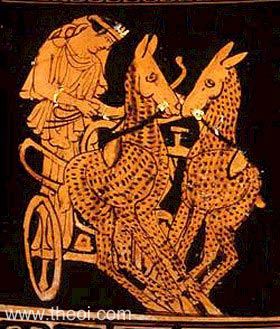
V. ARTEMIS CAPTURES GOLDEN-HORNED DEER FOR HER CHARIOT
"Thence departing (and thy hounds sped with thee) thou dist find by the base of the Parrhasian hill [in Arkadia] deer gamboling--a mighty herd. They always herded by the banks of the black-pebbled Anauros--larger than bulls, and from their horns shone gold. And thou wert suddenly amazed and saidst to thine own heart : ‘This would be a first capture worthy of Artemis.’ Five were there in all; and four thou didst take by speed of foot--without the chase of dogs--to draw thy swift car. But one escaped over the river Keladon, by devising of Hera, that it might be in the after days a labour for Herakles, and the Keryneian hill received her. Artemis, Parthenos (lady of Maidenhood), Tityoktone (Slayer of Tityos), golden were thine arms and golden thy belt, and a golden car didst thou yoke, and golden bridles, goddess, didst thou put on thy deer. And where first did thy horned team begin to carry thee? To Thrakian Haimos, whence comes the hurricane of Boreas bringing evil breath of frost to cloakless men.
VI. ARTEMIS EXERCISES HER NEW-FOUND POWERS
"And where didst thou cut the pine and from what flame didst thou kindle it? It was on Mysian Olympos, and
thou didst put in it the breath of flame unquenchable, which thy Father's bolts distil [to create
forest-fires].
And how often goddess, didst thou make trial of thy silver bow? First at an elm, and next at an oak didst thou
shoot, and third again at a wild beast. But the fourth time--not long was it ere thou didst shoot at the city of
unjust me, those who to one another and those who towards strangers wrought many deeds of sin, forward men, on
whom thou wilt impress thy grievous wrath. On their cattle plague feeds, on their tilth feeds frost, and the old
men cut their hair in mourning over their sons, and their wives either are smitten or die in childbirth, or, if
they escape, bear birds whereof none stands on upright ankle.
But on whomsoever thou lookest smiling and gracious, for them the tilth bears the corn-ear abundantly, and
abundantly prospers the four-footed breed, and abundant waxes their prosperity: neither do they go to the tomb,
save when they carry thither the aged. Nor does faction wound their race--faction which ravages even the
well-established houses: but brother's wife and husband's sister set their chairs around one board.
Lady, of that number be whosoever is a true friend of mine, and of that number may I be myself, O Queen. And may
song be my study forever. In that song shall be the Marriage of Leto; therein thy name shall often-times be
sung; therein shall Apollon be and therein all thy labours, and therein thy hounds and thy bow and thy chariot,
which lightly carry thee in thy splendour, when thou drivest to the house of Zeus.
VII. ARTEMIS ASCENDS TO OLYMPOS
"There in the entrance [of the house of Zeus] meet thee Hermes and Apollon: Hermes Akrakesios (the Lord of
Blessings) takes thy weapons, Apollon takes whatsoever wild beast thou bringest. Yea, so Apollon did before
strong Alkides [Herakles the god] came, but now Phoibos hath this task no longer; in such wise the Anvil of
Tiryns stands ever before the gates, waiting to see if thou wilt come home with some fat morsel. And all the
gods laugh at him with laughter unceasingly and most of all his own wife's mother [Hera] when he brings from the
car a great bull or a wild boar, carrying it by the hind foot struggling. With this sunning speech, goddess,
doth he admonish thee : ‘Shoot at the evil wild beasts that mortals may call thee their helper even as
they call me. Leave deer and hares to feed upon the hills. What harm could deer and hares do? It is boars which
ravage the tilth of men and boars which ravage the plants; and oxen are a great bane to men: shoot also at
those.’ So he spake and swiftly busied him about the mighty beast. For though beneath a Phrygian oak his
flesh was deified, yet hath he not ceased from gluttony. Still hath he that belly wherewith he met Theiodamas at
the plough.
For thee the Amnisiades (Nymphai of Amnisos) rub down the hinds loosed from the yoke, and from the mead of Hera
they gather and carry for them to feed on much swift-springing clover, which also the horses of Zeus eat; and
golden troughs they fill with water to be for the deer a pleasant draught. And thyself thou enterest thy
Father's house, and all alike bid thee to a seat; but thou sittest beside Apollon."
VIII. INVOCATIONS TO THE GODDESS
For the REST of this hymn see Hymns to Artemis
THE VIRGINITY OF ARTEMIS
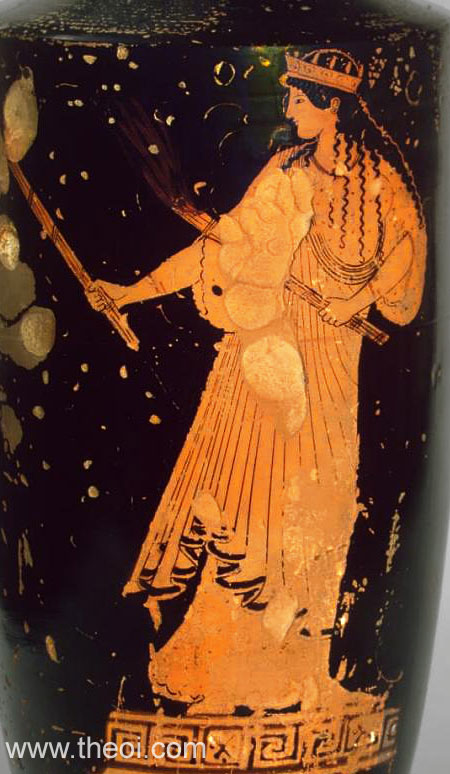
Homeric Hymn 5 to Aphrodite 6 ff (trans. Evelyn-White) (Greek epic C7th to 4th B.C.)
:
"Golden Aphrodite Kypria stirs up sweet passion in the gods and subdues the tribes of mortal men . . . Yet
there are three hearts that she cannot bend nor yet ensnare. First is the daughter of Zeus who holds the aegis,
bright-eyed Athene; for she has no pleasure in the deeds of golden Aphrodite . . . Nor does laughter-loving
Aphrodite ever tame in love Artemis the huntress with shafts of gold (khryselakatos); for she loves
archery and the slaying of wild beasts in the mountains, the lyre also and dancing and thrilling cries and shady
woods and the cities of upright men. Nor yet does the pure maiden Hestia love Aphrodite's works . . . Of these
three Aphrodite cannot bend or ensnare the hearts. But of all others there is nothing among the blessed gods or
among mortal men that has escaped Aphrodite."
Sappho, Fragment 34 (trans. Campbell, Vol. Greek Lyric I) (C6th B.C.) :
"Eros, loosener of limbs, never approaches her [Artemis]."
Pseudo-Apollodorus, Bibliotheca 1. 21 (trans. Aldrich) (Greek mythographer C2nd A.D.)
:
"Artemis became a practised huntress [after her birth] and remained a virgin."
Callimachus, Hymn 3 to Artemis 4 ff (trans. Mair) (Greek poet C3rd B.C.) :
"[Artemis] sitting on her father's knees--still a little maid--she spake these words to her sire [Zeus] :
‘Give me to keep my maidenhood, Father, forever . . .’ And her father smiled and bowed assent."
Diodorus Siculus, Library of History 5. 2. 3 (trans. Oldfather) (Greek historian C1st
B.C.) :
"And both Athene and Artemis . . . made the same choice of maidenhood as had Kore and were reared together
with her."
Ovid, Metamorphoses 3. 138 ff (trans. Melville) (Roman epic C1st B.C. to C1st A.D.)
:
"As the tale spread [of Artemis' transformation of Aktaion into a stag as punishment for seeing her naked]
views varied; some believed Diana's [Artemis'] violence unjust; some praised it, as proper to her chaste
virginity."
Ovid, Metamorphoses 5. 375 ff :
"[Venus-Aphrodite addresses Cupid-Eros :] ‘Do you not see how Pallas [Athene] and Diana [Artemis],
queen of the chase, have both deserted me [that is, abandoned love for virginity]?’"
For MYTHS of the failed wooers of Artemis see:
(1) Artemis Wrath: Orion & Artemis
Favour: Orion
(2) Artemis Wrath: Aloadae
(3) Artemis Wrath: Buphagus
(4) Artemis Wrath: Actaeon
(5) Artemis Wooed by Alpheus
ARTEMIS & THE ABDUCTION OF PERSEPHONE
Homeric Hymn 2 to Demeter 415 ff (trans. Evelyn-White) (Greek epic C7th or 6th B.C.)
:
"[Persephone relates the tale of her abduction to Demeter :] ‘All we were playing in a lovely meadow,
Leukippe and Phaino and Elektra and Ianthe [and various other Okeanides] . . . with Pallas [Athena] who rouses
battles and Artemis delighting-in-arrows (iokheaira): we were playing and gathering sweet flowers in
our hands, soft crocuses mingled with irises and hyacinths, and rose-blooms and lilies, marvellous to see [when
she was lured away from their company with a narcisuss flower and seized by Haides].’"
Pausanias, Description of Greece 8. 31. 2 (trans. Jones) (Greek travelogue C2nd A.D.)
:
"[Depicted in the temple of Demeter and Persephone at Megalopolis in Arkadia:] before them he made small
maids in tunics reaching to the ankles, each of whom carries on her head a basket full of flowers. They are said
to be daughters of Damophon, but those inclining to a more religious interpretation hold that they are Athena
and Artemis gathering the flowers with Persephone."
Diodorus Siculus, Library of History 5. 2. 3 (trans. Oldfather) (Greek historian C1st
B.C.) :
"And both Athene and Artemis, the myth goes on to say, who had made the same choice of maidenhood as had
Kore and were reared together with her [on the island of Sicily], joined with her in gathering the flowers, and
all of them together wove the robe for their father Zeus. And because of the time they had spent together and
their intimacy they all loved this island above any other, and each one of them received for her portion a
territory, Athene receiving hers in the region of Himera . . . Artemis received from the gods the island of
Syrakouse."
Pseudo-Hyginus, Fabulae 146 (trans. Grant) (Roman mythographer C2nd A.D.)
:
"[Zeus] bade him [Haides] seize her [Persephone] as she was gathering flowers on Mount Etna, which is in
Sicily. While Proserpina was gathering flowers with Venus [Aphrodite], Diana [Artemis], and Minerva [Athena],
Pluto [Haides] came in his four-horse chariot, and seized her."
Valerius Flaccus, Argonautica 5. 344 ff (trans. Mozley) (Roman epic C1st A.D.)
:
"Proserpine [Persephone] in spring-time led the dance over Hymettus' flowery ridges or beneath the cliffs
of Sicily, on this side stepping close by Pallas [Athene], on that side hand in hand with her beloved Diana
[Artemis], taller than they and surpassing her fellows, ere, she grew pale at the sight of Avernus [Haides] and
all her beauty fled."
Statius, Achilleid 1. 824 ff (trans. Mozley) (Roman epic C1st A.D.) :
"Beneath the rocks of Aetna in Sicily Diana [Artemis] and bold Pallas [Athene] and the consort of the
Elysian monarch [Persephone] shine forth among the Nymphae of Enna."
In the Eleusinian Mysteries, Artemis accompanied Demeter in her search for Persephone, and became a Khthonian companion of that goddess. The Eleusinians called her Hekate, who came to be regarded as a separate goddess.
See also Artemis Identified with Hecate
For MORE information on the abduction see RAPE OF
PERSEPHONE
ARTEMIS & THE WAR OF THE TITANS
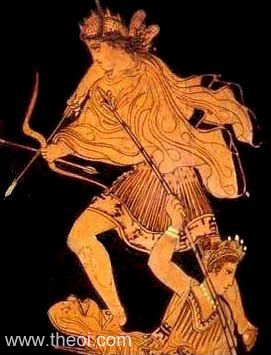
Pseudo-Hyginus, Fabulae 150 (trans. Grant) (Roman mythographer C2nd A.D.)
:
"War of the Titanes. After Juno [Hera] saw that Epaphus, born of a concubine, ruled such a great kingdom,
she saw to it that he should be killed while hunting, and encouraged the Titanes to drive Jove [Zeus] from the
kingdom and restore it to Saturnus [Kronos]. When they tried to mount heaven, Jove [Zeus] with the help of
Minerva [Athena], Apollo, and Diana [Artemis], cast them headlong into Tartarus."
For MORE information on the War of the Titans see TITANES
ARTEMIS & THE WAR OF THE GIANTS
When the Gigantes (Giants) made war on the gods of Olympos, Artemis fought in the battle ensued and slew the Gigante Aigaion with arrows.
Pseudo-Apollodorus, Bibliotheca 1. 38 (trans. Aldrich) (Greek mythographer C2nd A.D.)
:
"[In the war of the Gods and the Gigantes] Artemis killed Aigaion."
For MORE information on the War of the Giants see GIGANTES
ARTEMIS & THE GIANT TYPHOEUS
Antoninus Liberalis, Metamorphoses 28 (trans. Celoria) (Greek mythographer C2nd A.D.)
:
"Typhon felt an urge to usurp the rule of Zeus and not one of the gods could withstand him as he attacked.
In panic they fled to Aigyptos (Egypt), all except Athena and Zeus, who alone were left. Typhon hunted after
them, on their track. When they fled they had changed themselves in anticipation into animal forms.
Apollon became a hawk [i.e. the form of Egyptian Horus], Hermes an ibis [Thoth] . . . Artemis a cat [i.e. the
form of Egyptian Bastet]."
Pseudo-Hyginus, Astronomica 2. 28 (trans. Grant) (Roman mythographer C2nd A.D.)
:
"Egyptian priests and some poets say that once when many gods had assembled in Egypt, suddenly Typhon, an
exceedingly fierce monster and deadly enemy of the gods, came to that place. Terrified by him, they changed
their shapes into other forms: Mercurius [Hermes] became an ibis [the god Thoth], Apollo [Apollon], the bird
that is called Thracian [the god HOrus], Diana [Artemis], a cat [the goddess Bastet]. For this reason they say
the Egyptians do not permit these creatures to be injured, because they are called representations of
gods."
Ovid, Metamorphoses 5. 319 ff (trans. Melville) (Roman epic C1st B.C. to C1st A.D.)
:
"Typhoeus, issuing from earth's lowest depths, struck terror in those heavenly hearts, and they all turned
their backs and fled, until they found refuge in Aegyptus and the seven-mouthed Nilus . . . Typhoeus Terrigena
(Earthborn) even there pursued them and the gods concealed themselves in spurious shapes; ‘And Juppiter
[Zeus] became a ram,’ she said, ‘lord of the herd, and so today great Ammon Libys' [Zeus-Ammon]
shown with curling horns. Delius [Apollon] hid as a raven [Horus], Semeleia [Dionysos] as a goat, Phoebe
[Artemis] a cat [Bastet].’"
For MORE information on this giant see TYPHOEUS
ARTEMIS WOOED BY THE RIVER ALPHEUS
Pausanias, Description of Greece 6. 22. 8 (trans. Jones) (Greek travelogue C2nd A.D.)
:
"[The river-god] Alpheios fell in love with Artemis, and then, realizing that persuasive entreaties would
not win the goddess as his bride, he dared to plot violence against her. Artemis was holding at Letrinoi [in
Elis] an all-night revel with the nymphs who were her playmates, and to it came Alpheios. But Artemis had a
suspicion of the plot of Alpheios, and smeared with mud her own face and the faces of the Nymphai with her. So
Alpheios, when he joined the throng, could not distinguish Artemis from the others, and, not being able to pick
her out, went away without bringing off his attempt."
For a related MYTH see Artemis Favour: Arethusa
For MORE information on this god see ALPHEIOS
SOURCES
GREEK
- Hesiod, Theogony - Greek Epic C8th - 7th B.C.
- The Homeric Hymns - Greek Epic C8th - 4th B.C.
- Pindar, Fragments - Greek Lyric C5th B.C.
- Greek Lyric I Sappho, Fragments - Greek Lyric C6th B.C.
- Greek Lyric V Bacchylides Scolia, Fragments - Greek Lyric B.C.
- Apollodorus, The Library - Greek Mythography C2nd A.D.
- Callimachus, Hymns - Greek Poetry C3rd B.C.
- Strabo, Geography - Greek Geography C1st B.C. - C1st A.D.
- Pausanias, Description of Greece - Greek Travelogue C2nd A.D.
- The Orphic Hymns - Greek Hymns C3rd B.C. - C2nd A.D.
- Antoninus Liberalis, Metamorphoses - Greek Mythography C2nd A.D.
- Quintus Smyrnaeus, Fall of Troy - Greek Epic C4th A.D.
- Nonnus, Dionysiaca - Greek Epic C5th A.D.
ROMAN
- Hyginus, Fabulae - Latin Mythography C2nd A.D.
- Hyginus, Astronomica - Latin Mythography C2nd A.D.
- Ovid, Metamorphoses - Latin Epic C1st B.C. - C1st A.D.
- Seneca, Hercules Furens - Latin Tragedy C1st A.D.
- Valerius Flaccus, The Argonautica - Latin Epic C1st A.D.
- Statius, Achilleid - Latin Epic C1st A.D.
BIBLIOGRAPHY
A complete bibliography of the translations quoted on this page.